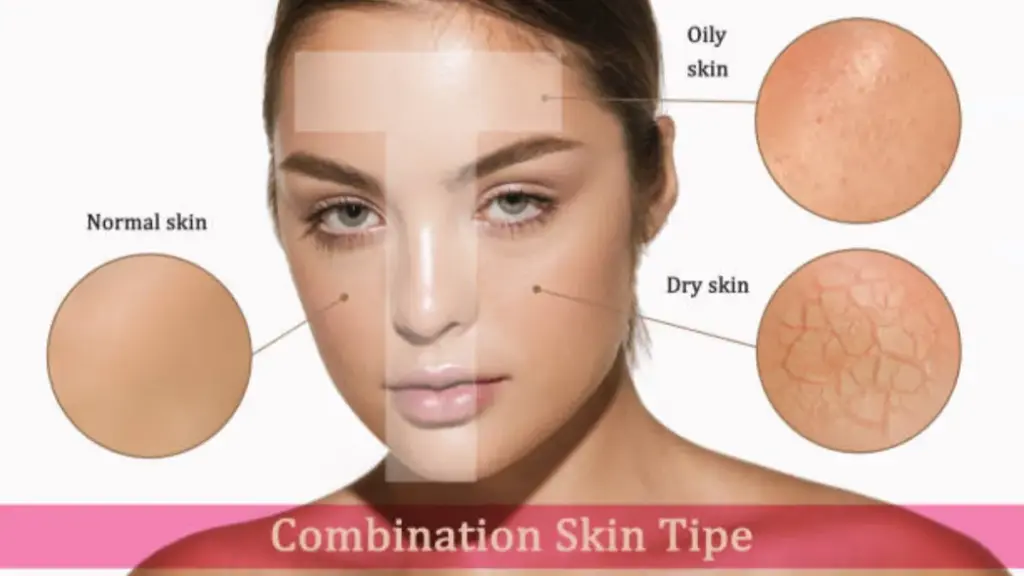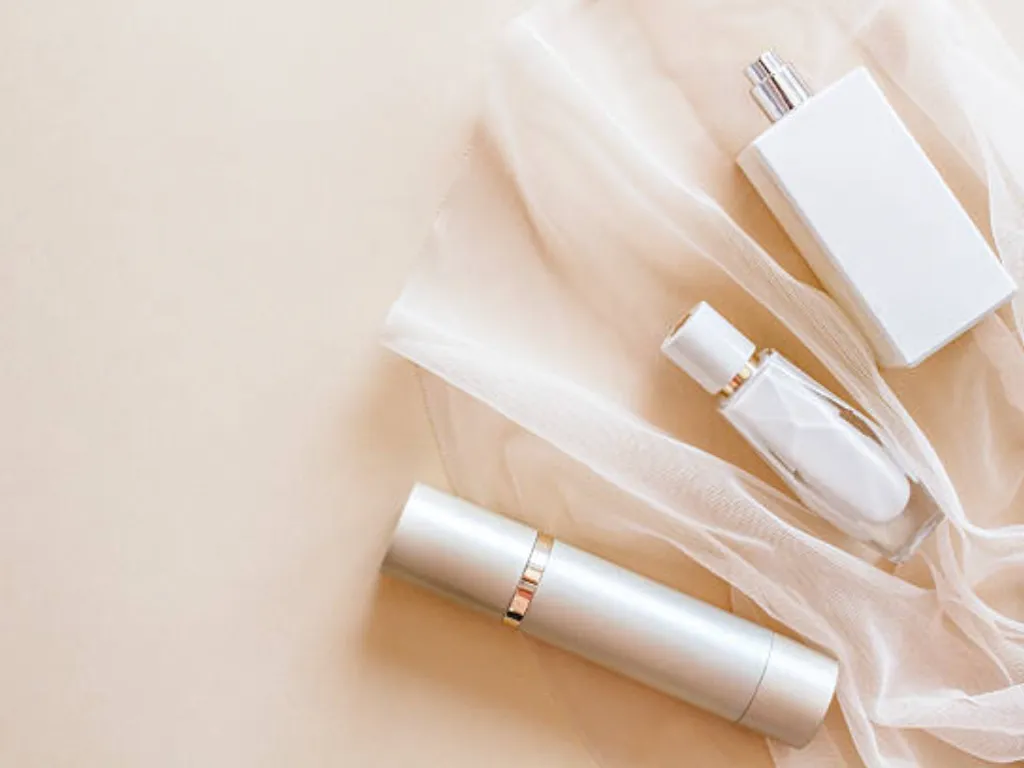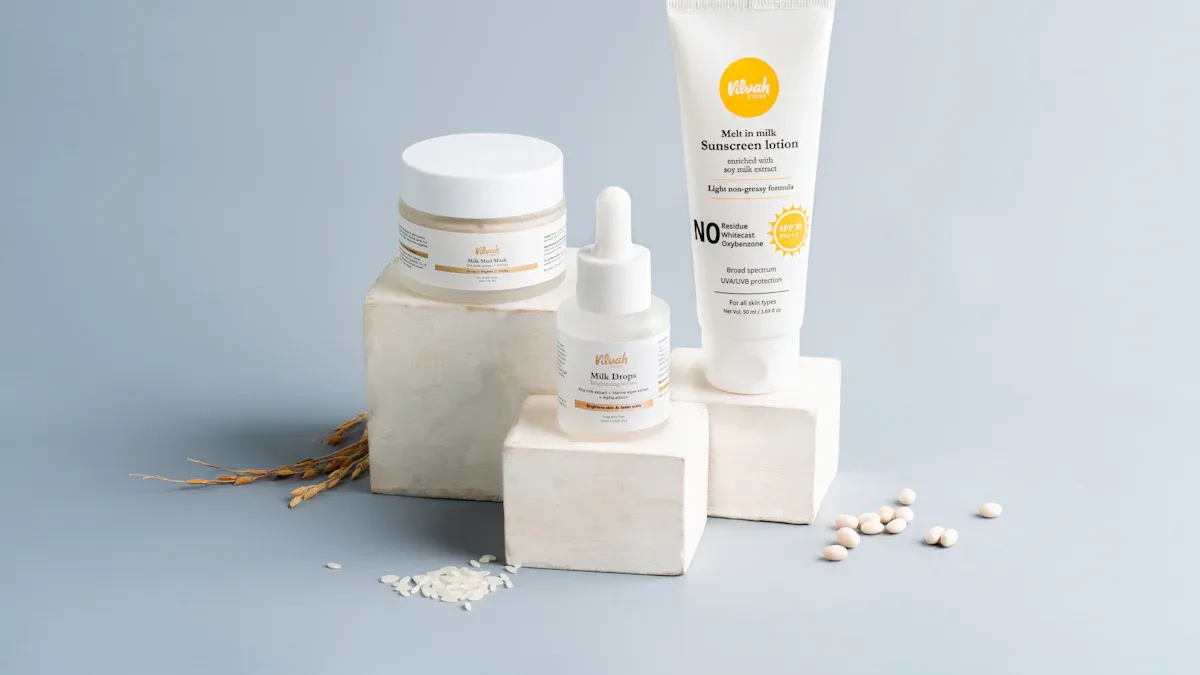
I prodotti per la cura della pelle a marchio del distributore stanno rimodellando il settore della bellezza, offrendoti la possibilità di lanciare un marchio di successo davvero unico. I numeri non mentono: questo mercato è in forte espansione, con proiezioni che raggiungono $38.9 miliardi di 2032 e un sano tasso di crescita annuale di 8.9%. Ciò che lo rende ancora migliore? I prodotti a marchio del distributore spesso producono margini di profitto pari a 70%. Attingendo a questo modello redditizio, puoi creare un marchio di cura della pelle di successo che si distingua. Con la giusta strategia, l'etichettatura privata ti consente di trasformare la tua visione in un fiorente marchio di cosmetici con etichetta privata.
Definisci la visione e la nicchia del tuo marchio
Identifica il tuo pubblico target
Conoscere il tuo pubblico è il primo passo per costruire un marchio di prodotti per la cura della pelle che abbia risonanza. Chi sono i tuoi clienti ideali? Sono giovani professionisti che si destreggiano tra impegni fittizi o individui eco-consapevoli che cercano soluzioni sostenibili per la cura della pelle? Dati demografici può aiutarti a rispondere a queste domande. Per esempio:
Componente | Dettagli |
|---|---|
Fascia d'età | 28-35 anni |
Fascia di reddito | $70-90K |
Tipo di posizione | Urbano |
Preoccupazioni della pelle | Pelle mista, primi segni di invecchiamento, sfoghi occasionali |
Comportamento d'acquisto | Effettua ricerche approfondite, legge le recensioni, disposto a pagare il premio |
Valori | Ingredienti puliti, imballaggio sostenibile, certificazione cruelty-free |
Questi dati rivelano che il tuo pubblico apprezza la trasparenza, sostenibilità, ed efficacia. Personalizzare la tua linea di prodotti per la cura della pelle per soddisfare queste esigenze non solo attirerà i clienti, ma favorirà anche la fidelizzazione. Ad esempio, offrire prodotti ipoallergenici o certificazioni cruelty-free può far risaltare la tua cura della pelle a marchio del distributore.
Quando definisci chiaramente il tuo pubblico, puoi creare messaggi personalizzati che rispondano direttamente alle loro esigenze. Questo approccio migliora la fedeltà al marchio e garantisce un’allocazione efficiente delle risorse, offrendoti un ritorno sull'investimento più elevato.
Stabilisci punti di vendita unici (USP)
La tua USP è ciò che rende indimenticabile il tuo marchio di prodotti per la cura della pelle. È il motivo per cui i clienti scelgono i tuoi prodotti rispetto ad altri. Per creare un USP convincente, concentrati su ciò che distingue la tua linea di cura della pelle. È il tuo impegno a pulire gli ingredienti? O forse le tue formulazioni innovative?
I brand di successo spesso evidenziano le loro USP attraverso lo storytelling. Prendere Fenty Beauty, Per esempio. Offrendo prodotti inclusivi per diverse tonalità della pelle, ha costruito una comunità leale. Allo stesso modo, The Ordinary semplifica la cura della pelle con elenchi di ingredienti trasparenti, educare i clienti mantenendo i prezzi accessibili.
Ecco alcune idee per ispirare la tua USP:
Puntare sull’inclusività: Offri prodotti per tutti i tipi e toni di pelle.
Evidenziare l'innovazione: Utilizza ingredienti unici o formulazioni avanzate.
Promuovere la sostenibilità: Utilizzare imballaggi ecologici e pratiche etiche.
Educa il tuo pubblico: Condividi la scienza dietro i tuoi prodotti per creare fiducia.
Una USP forte non solo attira i clienti, ma li fa tornare. Riduce inoltre il tasso di abbandono dei clienti e aumenta il Net Promoter Score, rendendo il tuo marchio di cosmetici a marchio del distributore uno dei preferiti sul mercato.
Allineare i valori del marchio con le tendenze del mercato
I valori del tuo marchio dovrebbero riflettere ciò che interessa al tuo pubblico. Proprio adesso, il mercato della cura della pelle si sta spostando verso la sostenibilità, personalizzazione, e pratiche etiche. I consumatori desiderano prodotti in linea con i loro valori, Piace formulazioni cruelty-free e imballaggi riciclabili.
Per esempio, marchi come Glow Recipe combinano un marchio giocoso con le tendenze K-beauty, Mentre Biopolvere sviluppa microsfere biodegradabili per ridurre gli sprechi. Questi sforzi trovano risonanza tra i clienti che danno priorità alle opzioni eco-compatibili.
Per allineare la tua linea di cura della pelle a queste tendenze, considerare:
Sostenibilità: Offrire soluzioni senz'acqua o imballaggi riciclabili.
Trasparenza: Elenca chiaramente gli ingredienti e i loro benefici.
Pratiche etiche: Impegnarsi per formulazioni cruelty-free e vegane.
Anticipando le tendenze del mercato, puoi posizionare il tuo marchio come leader nel settore della cura della pelle. Questo allineamento non solo attira i clienti ma crea anche fiducia, garantire il successo a lungo termine della tua impresa di cura della pelle con il marchio del distributore.
Sviluppo del prodotto
La creazione di una linea di prodotti per la cura della pelle straordinaria inizia con una solida strategia di sviluppo del prodotto. Questa fase è quella in cui la tua visione si trasforma in prodotti tangibili che soddisfano le esigenze del tuo pubblico. Analizziamolo passo dopo passo.
Scegli tra formulazioni pronte e personalizzate
Quando si tratta di formulazione del prodotto, hai due opzioni principali: formulazioni già pronte o personalizzate. Ognuno ha i suoi vantaggi, e la scelta giusta dipende dagli obiettivi del tuo marchio, budget, e cronologia.
Aspetto | Sviluppo personalizzato | |
|---|---|---|
Velocità sul mercato | Fase di sviluppo significativamente più breve | Dispendioso in termini di tempo, possono volerci settimane o mesi |
Efficienza dei costi | Più conveniente grazie ai test pre-completati | Costa tra i 1.000 e i 5.000 euro, complessivamente più alto |
Affidabilità comprovata | Convalidato per stabilità ed efficacia | Risultati su misura, ma nessuna convalida preventiva |
Personalizzazione | Opzioni di personalizzazione limitate | Completamente personalizzabile per esigenze specifiche |
Rischio di sovrapposizione | Sul mercato possono esistere formulazioni simili | Formulazioni uniche su misura per il marchio |
Se stai cercando di lanciare rapidamente e mantenere bassi i costi, le formulazioni già pronte sono un'ottima scelta. Questi sono pre-testati per stabilità ed efficacia, rendendoli affidabili e facili da immettere sul mercato. Tuttavia, potrebbero non avere l'unicità di cui il tuo marchio di prodotti per la cura della pelle ha bisogno per distinguersi.
D'altra parte, formulazioni personalizzate ti permettono di creare qualcosa di veramente unico. Puoi personalizzare gli ingredienti, struttura, e profumo per allinearsi con l'identità del tuo marchio. Mentre questa opzione richiede più tempo e investimenti, garantisce che i tuoi prodotti siano unici nel loro genere.
💡 Mancia: Se sei nuovo all'etichettatura privata, considerare di iniziare con formulazioni già pronte. Una volta che il tuo marchio guadagna terreno, puoi esplorare opzioni personalizzate per espandere la tua linea di prodotti per la cura della pelle.
Acquistare materie prime di alta qualità
La qualità dei tuoi ingredienti influisce direttamente sull'efficacia e sulla reputazione dei tuoi prodotti per la cura della pelle. L'approvvigionamento di materie prime di alta qualità dovrebbe essere una priorità assoluta nel processo di sviluppo dei prodotti per la cura della pelle.
Garanzia di qualità | Iniziative di sostenibilità | Soddisfazione del cliente |
|---|---|---|
Rigoroso misure di controllo della qualità garantire la consistenza e l’affidabilità delle nostre materie prime. | Diamo priorità alle pratiche di approvvigionamento ecocompatibili per supportare una produzione sostenibile ed etica. | Il nostro team dedicato si impegna a fornire assistenza e supporto personalizzati, garantendo un'esperienza senza soluzione di continuità per i nostri clienti. |
Per garantire la migliore qualità:
Lavorare con i fornitori che forniscono Certificati di analisi (COA).
Richiedi le schede di sicurezza dei materiali (Scheda di sicurezza) per ogni ingrediente.
Verificare la purezza, sicurezza, e tracciabilità di tutte le materie prime attraverso una documentazione completa.
Sono essenziali anche le revisioni di routine dei fornitori e i report sulla qualità in tempo reale. Queste pratiche ti aiutano a mantenere standard elevati rimanendo allineati alla domanda di trasparenza e sostenibilità dei consumatori.
Implementare misure di controllo della qualità
Il controllo di qualità è la spina dorsale di ogni marchio di prodotti per la cura della pelle di successo. Garantisce che i tuoi prodotti siano sicuri, efficace, e coerente. Senza di essa, rischi di perdere la fiducia dei clienti e di danneggiare la reputazione del tuo marchio.
Ecco come implementare solide misure di controllo della qualità:
Parametri di test: Condurre test rigorosi per il fisico, chimico, e parametri microbiologici. Ciò garantisce che i tuoi prodotti soddisfino gli standard di sicurezza e prestazioni.
Tracciabilità: Mantenere la documentazione dettagliata per ogni lotto di prodotti. Ciò include le fonti degli ingredienti, date di produzione, e risultati di test.
Mitigazione del rischio: Identificare i potenziali rischi nelle materie prime e nelle formulazioni. Utilizza controlli e test aggiuntivi per affrontare questi problemi in modo proattivo.
Metodologia | Descrizione |
|---|---|
Implica test rigorosi contro quelli fisici, chimico, e parametri microbiologici. | |
Tracciabilità e documentazione | Garantisce la trasparenza nella catena di fornitura con una documentazione dettagliata, compresi i certificati di analisi. |
Valutazione e mitigazione del rischio | Identifica i rischi intrinseci nelle materie prime e implementa strategie per mitigarli attraverso audit e test. |
Dando priorità alla qualità in ogni fase, non solo proteggi i tuoi clienti, ma rafforzi anche la credibilità del tuo marchio. Ricordare, un prodotto per la cura della pelle che fornisce risultati costanti conquisterà sempre la fedeltà dei clienti.
Imballaggio ed etichettatura
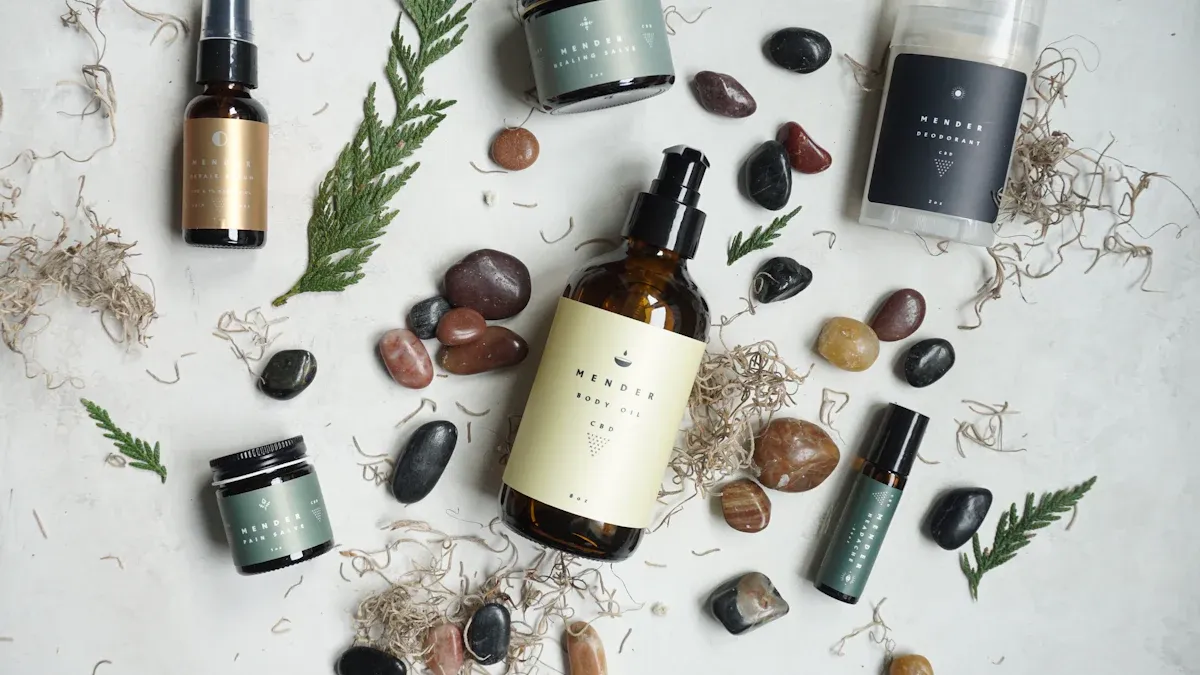
Progettare imballaggi funzionali ed estetici
Il packaging gioca un ruolo enorme nel modo in cui vengono percepiti i tuoi prodotti per la cura della pelle. Non si tratta solo di avere un bell'aspetto, ma anche di essere pratici. Il packaging funzionale rende i tuoi prodotti più facili da usare, mentre i design estetici attirano l'attenzione e raccontano la storia del tuo marchio.
Prendi ispirazione da marchi come Milk Makeup, che utilizza contenitori a doppia parete con applicatori rollball in metallo per un effetto rinfrescante. Oppure FARSÁLI, che incorpora pompe airless per mantenere i prodotti freschi. Questi design non sono solo fantastici; migliorano l'esperienza dell'utente.
Esempio di progettazione | Descrizione |
|---|---|
Acqua di raffreddamento per il trucco del latte | Presenta un contenitore a doppia parete con un applicatore rollball in metallo per un effetto rinfrescante. |
Pompe Airless FARSÁLI | Utilizza pompe airless e contagocce per mantenere la freschezza del prodotto. |
Imballaggio sostenibile | Enfatizza i materiali ecologici e i prodotti ricaricabili. |
Un imballaggio ben progettato aumenta anche la commerciabilità. Fa risaltare il tuo marchio di prodotti per la cura della pelle a marchio del distributore in un mercato affollato. Una bella confezione aumenta la qualità percepita dei tuoi prodotti, Costruisce la fiducia, e li rende anche ideali da regalare. Più, crea un'esperienza di unboxing memorabile che fa sì che i clienti tornino.
Dare priorità alla sostenibilità nelle scelte di packaging
La sostenibilità non è solo una tendenza, è una necessità. I consumatori hanno a cuore il packaging sostenibile, e molti non compreranno prodotti che non siano in linea con i loro valori. Scegliendo materiali ecosostenibili, puoi soddisfare questa domanda e dimostrare il tuo impegno per la sostenibilità nel packaging.
Prendi in considerazione l'utilizzo di materiale riciclabile, biodegradabile, o opzioni ricaricabili. Queste scelte riducono gli sprechi e attraggono i clienti eco-consapevoli. Per esempio, i contenitori ricaricabili non solo riducono al minimo l'impatto ambientale ma incoraggiano anche gli acquisti ripetuti.
💡 Mancia: Evidenzia i tuoi sforzi per la sostenibilità sulla confezione. La trasparenza crea fiducia e mostra ai clienti che il tuo marchio ha a cuore il pianeta.
Garantire la conformità alle normative sull'etichettatura
Un'etichettatura chiara e accurata è essenziale per i tuoi prodotti per la cura della pelle. Non si tratta solo di conformità: si tratta di creare fiducia con i tuoi clienti. Secondo i sondaggi, 46% dei consumatori evita prodotti con etichette poco chiare.
Per garantire la conformità, includere tutte le informazioni richieste, come elenchi di ingredienti, istruzioni per l'uso, e avvertenze di sicurezza. Assicurati che le tue etichette soddisfino le normative regionali e siano facili da leggere. Questa trasparenza rassicura i clienti e li rende più propensi a scegliere il tuo marchio di cosmetici a marchio del distributore.
Per la punta: Ricontrolla le tue etichette per verificarne l'accuratezza e la chiarezza. Gli errori possono portare a problemi legali e danneggiare la reputazione del tuo marchio.
Conformità normativa
Gestire la conformità normativa è essenziale per lanciare un marchio di prodotti per la cura della pelle a marchio del distributore di successo. Garantisce che i tuoi prodotti soddisfino gli standard di sicurezza, costruire la fiducia del cliente, ed evitare problemi legali. Analizziamo i passaggi chiave per rimanere conformi.
Comprendere i requisiti legali regionali
Ogni regione ha le proprie regole per i prodotti per la cura della pelle. Alcuni Paesi, come gli Stati Uniti e l’Unione Europea, applicare norme severe, mentre altri, come India e Brasile, sono meno stringenti. Conoscere queste differenze ti aiuta a personalizzare il tuo approccio.
Paese | Importanza del quadro normativo | Aree di interesse chiave |
|---|---|---|
Stati Uniti | Rigoroso | Approvazione pre-commercializzazione, controllo degli ingredienti |
Unione Europea | Rigoroso | Etichettatura, avvertimenti |
Giappone | Rigoroso | Sicurezza, efficacia |
India | Meno rigoroso | Conformità normativa |
Brasile | Meno rigoroso | Conformità normativa |
Cina | Meno rigoroso | Conformità normativa |
Per esempio, se vendi nell'UE, dovrai seguire rigide regole di etichettatura e fornire avvertenze di sicurezza. Negli Stati Uniti, l’approvazione pre-commercializzazione e il controllo degli ingredienti sono fondamentali. Ricerca le normative nel tuo mercato di riferimento per evitare errori costosi.
Registra i prodotti presso le autorità competenti
Prima di lanciare la tua linea di prodotti per la cura della pelle, dovrai registrare i tuoi prodotti presso le autorità competenti. Questo passaggio garantisce che il tuo marchio di cosmetici a marchio del distributore sia conforme alle leggi locali e crei credibilità presso i clienti.
Negli Stati Uniti, la FDA supervisiona la registrazione dei prodotti per la cura della pelle. Dovrai inviare informazioni dettagliate sulle tue formulazioni, compresi gli elenchi degli ingredienti e i dati sulla sicurezza. L’UE richiede una documentazione simile ai sensi del suo regolamento sui prodotti cosmetici. Altre regioni, come il Giappone e il Canada, concentrarsi sulla sicurezza e sull’efficacia degli ingredienti.
💡 Mancia: Mantieni organizzato il tuo processo di registrazione. Crea una lista di controllo per ciascun mercato per tenere traccia dei requisiti e delle scadenze. Questo approccio fa risparmiare tempo e riduce lo stress.
Mantenere la documentazione per la sicurezza e la trasparenza
La documentazione è la tua rete di sicurezza. Dimostra che i tuoi prodotti soddisfano gli standard di conformità normativa e protegge il tuo marchio da problemi legali. Più, rassicura i clienti che i tuoi sforzi di etichettatura privata danno priorità alla qualità e alla trasparenza.
Ecco cosa ti servirà:
Conformità degli ingredienti: Assicurarsi che tutti gli ingredienti soddisfino le normative locali. Alcune regioni, come l'UE, vietare alcune sostanze, quindi ricontrolla le tue formulazioni.
Conformità dell'etichettatura e dell'imballaggio: Includi informazioni chiare sulle etichette, come il nome del prodotto, ingredienti, e istruzioni per l'uso. Evita affermazioni fuorvianti e segui i requisiti della lingua locale.
Regolamento sul marketing: Sii onesto riguardo alle affermazioni sui tuoi prodotti. Per esempio, termini come “naturale” O “organico” possono avere linee guida specifiche nell’UE ma mancano di definizioni ufficiali negli Stati Uniti.
Aspetto | Dettagli |
|---|---|
Conformità degli ingredienti | I prodotti per la cura della pelle devono rispettare le normative sugli ingredienti che variano in base al mercato, con alcuni ingredienti soggetti a restrizioni o vietati in regioni come l’UE, Canada, e Giappone. Le startup devono procurarsi gli ingredienti in modo etico e garantire la sicurezza attraverso la ricerca e i test. |
Conformità dell'etichettatura e dell'imballaggio | Le etichette devono fornire informazioni chiare compreso il nome del prodotto, ingredienti, e indicazioni per l'uso, aderendo a normative specifiche come il Fair Packaging and Labeling Act negli Stati Uniti e il Regolamento sui prodotti cosmetici nell'UE. Le startup devono evitare affermazioni fuorvianti e garantire il rispetto dei requisiti linguistici locali. |
Regolamento sul marketing | Diverse giurisdizioni hanno regole diverse per l'etichettatura e la commercializzazione dei prodotti, compresa la necessità di dichiarazioni precise e informazioni specifiche quali numeri di lotto e paese di origine. Negli Stati Uniti, non esistono definizioni ufficiali per termini come “naturale”.’ o "biologico", mentre l’UE ha stabilito linee guida per tali affermazioni. |
Mantenendo una documentazione approfondita, sarai al passo con le sfide normative e costruirai un marchio affidabile. I clienti apprezzeranno la tua trasparenza, ed eviterai inutili contrattempi.
Scelta di un produttore
Trovare il produttore giusto è uno dei passaggi più critici nel lancio del tuo marchio di prodotti per la cura della pelle con il marchio del distributore. Un partner affidabile garantisce che i tuoi prodotti soddisfino gli standard di qualità, allineati con la tua visione, e distinguersi sul mercato. Ecco come valutare e scegliere la soluzione più adatta alle tue esigenze.
Valutare le certificazioni e la reputazione del produttore
Le certificazioni la dicono lunga sulla credibilità di un produttore. Cerca certificazioni come Buone pratiche di produzione (GMP) e gli standard ISO. Ciò garantisce che il produttore segua rigorosi protocolli di qualità e sicurezza. Conformità ai quadri normativi, come le linee guida della FDA negli Stati Uniti. o relazioni sulla sicurezza dei prodotti cosmetici dell'UE (CPSR), è anche essenziale.
Anche la reputazione conta. Revisioni della ricerca, testimonianze, e casi di studio di altri marchi che hanno collaborato con il produttore. Un solido track record dimostra che possono fornire risultati coerenti. Non esitate a chiedere referenze o a visitare la loro struttura, se possibile. Questo passaggio ti aiuta a confermare il loro impegno per la qualità e la trasparenza.
Mancia: Un produttore con certificazioni e una solida reputazione non solo garantisce la sicurezza del prodotto, ma aumenta anche la credibilità del tuo marchio.
Valuta le opzioni di personalizzazione per i tuoi prodotti
La personalizzazione è la chiave per rendere unica la tua linea di skincare. I migliori produttori offrono una gamma di opzioni, dalla selezione degli ingredienti alla personalizzazione della fragranza e del colore. Per esempio, puoi scegliere ingredienti specifici per rispondere alle preoccupazioni della pelle del tuo pubblico target o optare per profumi personalizzati che riflettono l'identità del tuo marchio.
Alcuni produttori utilizzano addirittura strumenti avanzati come test del DNA o analisi della pelle per creare prodotti altamente personalizzati. Queste opzioni non solo migliorano la differenziazione del prodotto, ma migliorano anche la soddisfazione del cliente. Offrire soluzioni personalizzate mostra al tuo pubblico che il tuo marchio comprende veramente le loro esigenze.
Per la punta: Inizia con semplici opzioni di personalizzazione come la selezione di ingredienti e fragranze. Man mano che il tuo marchio cresce, esplora strumenti di personalizzazione avanzati per migliorare la tua linea di prodotti.
Costruisci una forte partnership con il tuo produttore
Una partnership di successo va oltre i contratti. La comunicazione è il fondamento di una relazione forte. Condividi chiaramente la visione del tuo marchio e assicurati che il produttore comprenda i tuoi obiettivi. Aggiornamenti regolari e un dialogo aperto ti aiutano a rimanere allineato durante tutto il processo di produzione.
La fiducia è un altro fattore cruciale. Scegli un produttore che valorizza la trasparenza e mantiene le promesse. Cercane uno che offra soluzioni flessibili, quali quantità di ordine minimo basse (Moqs) o tempi di produzione rapidi. Queste funzionalità semplificano l’adattamento e la scalabilità del tuo marchio.
Ricordare: Un buon produttore non è solo un fornitore: è un partner per il successo del tuo marchio. Costruire una relazione forte garantisce operazioni più fluide e risultati migliori.
Evidenzia l'esperienza di Oully nella produzione di prodotti per la cura della pelle con marchio del distributore
Quando si tratta di produzione di prodotti per la cura della pelle a marchio del distributore, Oully si distingue come partner di fiducia. Con eccesso 10 anni di esperienza, Oully ha aiutato marchi come il tuo a trasformare le loro idee in prodotti di successo. La loro esperienza copre tutto, dalla formulazione al confezionamento, rendendo il processo fluido e senza stress per te.
Perché scegliere Oully?
Oully offre una serie di vantaggi che li rendono la scelta perfetta per il tuo marchio di prodotti per la cura della pelle:
Certificazioni di cui ti puoi fidare: Il loro FDA, Iso-, e la struttura certificata cGMP garantisce che i tuoi prodotti soddisfino i più elevati standard di sicurezza e qualità.
Soluzioni personalizzabili: Sia che tu voglia formulazioni già pronte o miscele personalizzate uniche, Oully offre opzioni flessibili su misura per le vostre esigenze.
Tempi di inversione rapidi: Con una tempistica di produzione di appena 51 giorni, puoi lanciare rapidamente i tuoi prodotti senza compromettere la qualità.
Quantità minime di ordine basse (Moqs): Inizia in piccolo e amplia man mano che il tuo marchio cresce. I bassi MOQ di Oully facilitano l’ingresso di nuovi marchi nel mercato.
Ciò che distingue Oully?
Oully non si limita a produrre prodotti, ma ti aiuta a costruire un marchio. Il loro team lavora a stretto contatto con te per dare vita alla tua visione. Ecco come lo realizzano:
Caratteristica | Beneficio |
|---|---|
Pratiche sostenibili | Le opzioni di approvvigionamento e imballaggio ecocompatibili sono in linea con i valori dei consumatori. |
Portata globale | Servire i clienti in oltre 20 Paesi, Oully ti aiuta ad espandere il tuo mercato. |
Servizi di dropshipping | Semplifica la logistica con soluzioni dropshipping affidabili. |
Per la punta: Collaborare con Oully significa non solo acquisire un produttore, ma anche un team che investe nel tuo successo.
Con l’esperienza di Oully, puoi concentrarti sulla crescita del tuo marchio mentre loro gestiscono i dettagli tecnici. Il loro impegno per l'innovazione, qualità, e la sostenibilità garantisce che i tuoi prodotti si distinguano nel competitivo mercato della cura della pelle.
Marchio e marketing
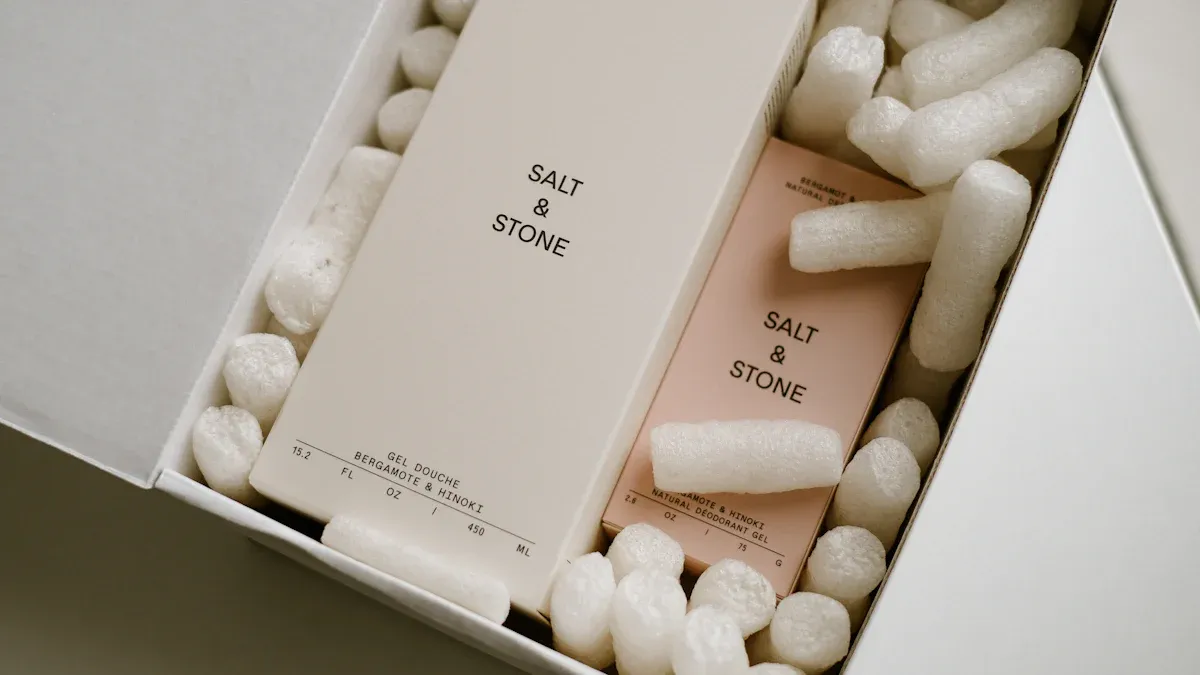
Sviluppare un'identità di marca coesa
L’identità del tuo marchio di prodotti per la cura della pelle è la prima cosa che i clienti notano. Non si tratta solo di un logo o di un packaging: è la personalità del tuo marchio. Per lasciare un'impressione duratura, concentrati sulla creazione di un'identità coerente e visivamente accattivante che risuoni con il tuo pubblico.
Comprendi il tuo pubblico e cosa apprezzano. Sono attratti dalla bellezza pulita o dall'innovazione audace?
Definisci la tua proposta di valore unica. Ciò che distingue la tua linea di prodotti per la cura della pelle a marchio del distributore?
Collabora con i designer per creare un logo memorabile e un'estetica coerente.
La coerenza è fondamentale. Usa gli stessi colori, caratteri, ed elementi di progettazione su tutte le piattaforme. Questo stile visivo rafforza l'identità del tuo marchio e crea riconoscimento. Quando i clienti vedono i tuoi prodotti online o nei negozi, dovrebbero collegarli immediatamente al tuo marchio.
Mancia: La tua identità visiva non è solo una decorazione: è un potente strumento per comunicare i tuoi valori e posizionare il tuo marchio di prodotti per la cura della pelle sul mercato.
Sfrutta i canali di marketing digitale
Il marketing digitale è la tua arma segreta per aumentare la visibilità. Con più clienti che ricercano e acquistano prodotti per la cura della pelle online, UN forte presenza online è essenziale.
Inizia creando un sito web facile da usare. Metti in mostra i tuoi prodotti con immagini di alta qualità e descrizioni dettagliate. Aggiungi le recensioni dei clienti per creare fiducia. Prossimo, concentrarsi su piattaforme di social media come Instagram e TikTok. Sono perfetti per condividere consigli sulla cura della pelle, Tutorial, e contenuti dietro le quinte.
Coinvolgere la Generazione Z creando contenuti su misura per le loro preferenze.
Collabora con influencer per raggiungere nuovo pubblico.
Utilizza annunci mirati per promuovere in modo efficace il tuo marchio di cosmetici a marchio del distributore.
L’email marketing è un altro potente strumento. Invia messaggi personalizzati ai tuoi iscritti, offrendo sconti esclusivi o consigli sulla cura della pelle. Ciò mantiene i tuoi clienti coinvolti e incoraggia gli acquisti ripetuti.
Per la punta: Il marketing digitale non riguarda solo la vendita, ma la costruzione di relazioni. Mostra al tuo pubblico che il tuo marchio ha a cuore il loro percorso di cura della pelle.
Interagisci con influencer e costruisci community
Gli influencer cambiano le regole del gioco nel marketing della cura della pelle. Hanno seguaci fedeli che si fidano dei loro consigli. La collaborazione con influencer può aiutarti a presentare il tuo marchio a un pubblico più ampio.
Scegli influencer in linea con i valori del tuo marchio. Per esempio, se la sostenibilità è un obiettivo centrale, lavorare con creatori eco-consapevoli. Fornisci loro i tuoi prodotti e lascia che condividano le loro esperienze oneste. L'autenticità è fondamentale: crea fiducia e stimola le vendite.
Costruire una comunità attorno al tuo marchio è altrettanto importante. Crea spazi in cui i clienti possano condividere le loro storie sulla cura della pelle, fare domande, e connettersi con gli altri. Utilizza i gruppi sui social media, forum, o addirittura vivere Q&Una sessione per favorire il coinvolgimento.
Mancia: Una comunità forte trasforma i clienti in sostenitori fedeli dei tuoi sforzi di etichettatura privata.
Lancio del tuo marchio
Pianifica un lancio graduale per testare il mercato
Un lancio morbido è la tua occasione per testare il terreno prima di dare il massimo. Ti aiuta a identificare cosa funziona e cosa no senza la pressione di un rilascio su vasta scala. Inizia offrendo i tuoi prodotti per la cura della pelle a un piccolo gruppo di clienti. Questi potrebbero essere seguaci fedeli, amici, o anche un gruppo selezionato di influencer.
Questo approccio consente di raccogliere informazioni preziose. Imparerai come i clienti percepiscono i tuoi prodotti, confezione, e l'esperienza complessiva del marchio. Per esempio, se amano la texture della tua crema idratante ma trovano difficile usare la pompetta, è possibile apportare modifiche prima del lancio ufficiale.
Mantieni il processo semplice. Utilizza sondaggi o moduli di feedback diretto per raccogliere opinioni. Presta attenzione ai temi ricorrenti nelle loro risposte. Questi dati ti aiuteranno a perfezionare il tuo marchio di prodotti per la cura della pelle e a garantire un lancio di successo.
Mancia: Tratta il tuo lancio morbido come una prova generale. Più impari adesso, più agevole sarà il tuo lancio completo.
Crea buzz con le campagne pre-lancio
Creare entusiasmo prima del lancio è fondamentale. Una forte campagna pre-lancio può generare curiosità e attrarre i primi utilizzatori. Inizia stuzzicando il tuo pubblico con anteprime dei tuoi prodotti sui social media. Condividi contenuti dietro le quinte, come il modo in cui ha preso vita la tua linea di prodotti per la cura della pelle a marchio del distributore.
Collaborare con influencer può amplificare la tua portata. Ad esempio, Immagine Mirata alla cura della pelle 1,000 membri della comunità di bellezza Dabble di PopSugar per promuovere il suo siero antietà Vital C. Nonostante solo 13% degli utenti che conoscono il brand, 96% hanno detto che consiglierebbero il prodotto a un amico. Questo è il potere del buzz pre-lancio!
Le aziende con campagne pre-lancio efficaci spesso vendono fino a tre volte di più rispetto a quelli senza. Usa i conti alla rovescia, omaggi, o accesso anticipato esclusivo per mantenere il tuo pubblico coinvolto. Queste strategie creano anticipazione e fanno sentire i tuoi clienti come se fossero parte di qualcosa di speciale.
Per la punta: Più entusiasmo crei, più memorabile sarà il tuo lancio.
Monitora il feedback e ottimizza le strategie post-lancio
Una volta che il tuo marchio di prodotti per la cura della pelle sarà attivo, il lavoro non si ferma. Presta molta attenzione al feedback dei clienti durante le prime settimane. Monitorare le recensioni, commenti sui social media, e messaggi diretti. Queste informazioni ti aiuteranno a capire cosa ha successo e cosa necessita di miglioramenti.
Se i clienti menzionano problemi, affrontarli rapidamente. Per esempio, se trovano il tuo detergente troppo secco, prendere in considerazione la possibilità di modificare la formula o offrire suggerimenti per un utilizzo migliore. Il feedback positivo è altrettanto importante. Evidenzia ciò che i clienti apprezzano e utilizzalo per guidare lo sviluppo futuro del prodotto.
Utilizza strumenti di analisi per monitorare le vendite, traffico del sito web, e impegno. Queste metriche ti mostreranno cosa funziona e dove puoi migliorare. Modifica le tue strategie di marketing in base a questi dati per mantenere lo slancio.
Ricordare: Un lancio di successo è solo l’inizio. Il miglioramento continuo fa crescere il tuo marchio e soddisfa i tuoi clienti.
Il lancio di un marchio di prodotti per la cura della pelle a marchio del distributore potrebbe sembrare travolgente, ma suddividerlo in passaggi chiari lo rende realizzabile. Inizia definendo la tua visione e la tua nicchia. Costruisci prodotti in linea con le esigenze e i valori del tuo pubblico. Scegli un produttore affidabile e concentrati sulla qualità in ogni fase. Una volta che i tuoi prodotti sono pronti, creare una forte identità di marca e commercializzarla in modo efficace. Finalmente, monitora il feedback dopo il lancio per perfezionare le tue offerte.
L’adattabilità è la tua arma segreta in questo settore. Le tendenze cambiano, e le preferenze dei clienti si evolvono. Rimanendo flessibili e ascoltando il tuo pubblico, puoi costruire un'attività di successo nel settore della cura della pelle che prospera a lungo termine. Ad esempio, monitoraggio di metriche come punteggi di soddisfazione del cliente e coinvolgimento sui social media ti aiuta a capire cosa funziona. L'adeguamento basato su queste informazioni può aumentare la fidelizzazione e la redditività.
COSÌ, Perché aspettare? Fai il primo passo oggi. Il tuo marchio di prodotti per la cura della pelle di successo è solo un'idea lontana dal diventare realtà.
FAQ
1. Cos'è la cura della pelle a marchio del distributore?
I prodotti per la cura della pelle con il marchio del distributore ti consentono di vendere prodotti con il tuo marchio senza produrli tu stesso. Collabori con un produttore per creare formulazioni personalizzate o già pronte in linea con la tua visione. È un ottimo modo per costruire rapidamente un marchio unico.
2. Quanto costa avviare un marchio di prodotti per la cura della pelle a marchio del distributore?
I costi variano in base a fattori come la personalizzazione del prodotto, confezione, e marketing. Puoi iniziare con il minimo $5,000 per formulazioni di base già pronte. Formulazioni personalizzate o imballaggi premium possono richiedere un budget più elevato.
3. Posso lanciare un marchio di prodotti per la cura della pelle a marchio del distributore con MOQ bassi?
SÌ! Molti produttori, come Oully, offrire quantità minime di ordine basse (Moqs). Questa flessibilità ti aiuta a testare il mercato senza impegnarti in grandi scorte. È perfetto per startup o marchi con budget limitati.
4. Come posso garantire che i miei prodotti soddisfino i requisiti normativi??
Ricerca le normative nel tuo mercato di riferimento. Collabora con un produttore che fornisce documentazione come certificati di analisi (COA). Includi elenchi chiari degli ingredienti e avvertenze di sicurezza sulle etichette per rimanere conforme.
5. Perché il branding è importante per una linea di prodotti per la cura della pelle?
Il branding distingue i tuoi prodotti. Crea un'identità memorabile che risuona con il tuo pubblico. Un marchio forte crea fiducia, attira clienti fedeli, e aumenta le vendite. Considerala la personalità della tua linea di prodotti per la cura della pelle.

